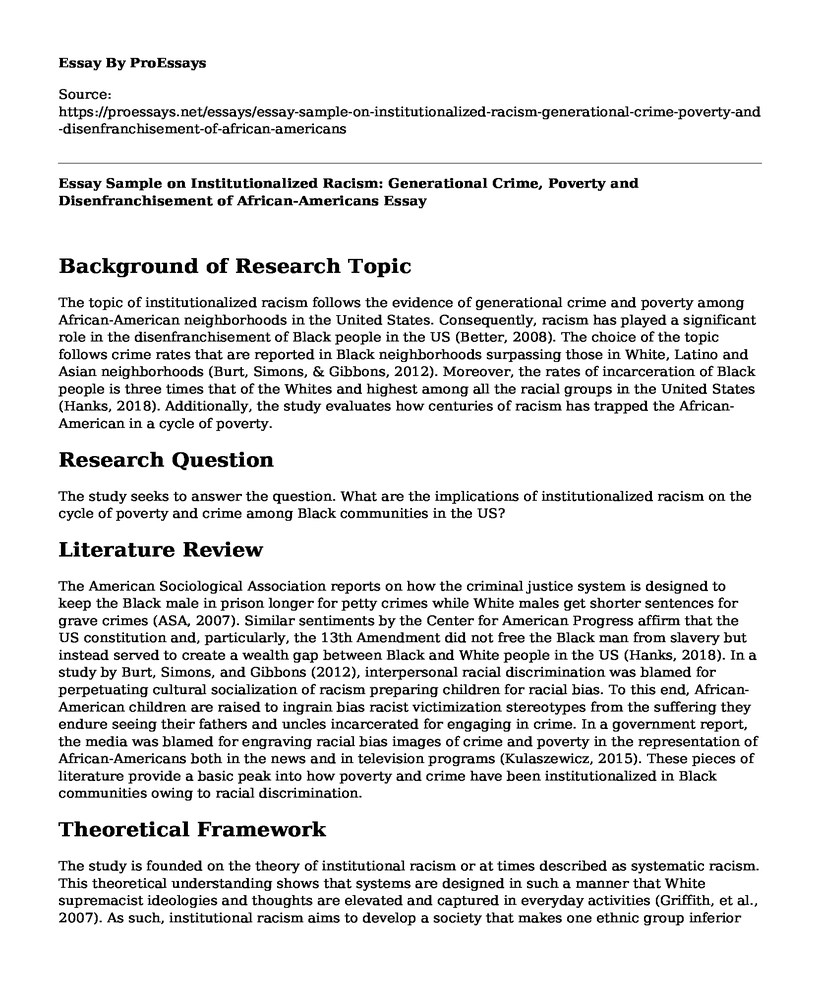Background of Research Topic
The topic of institutionalized racism follows the evidence of generational crime and poverty among African-American neighborhoods in the United States. Consequently, racism has played a significant role in the disenfranchisement of Black people in the US (Better, 2008). The choice of the topic follows crime rates that are reported in Black neighborhoods surpassing those in White, Latino and Asian neighborhoods (Burt, Simons, & Gibbons, 2012). Moreover, the rates of incarceration of Black people is three times that of the Whites and highest among all the racial groups in the United States (Hanks, 2018). Additionally, the study evaluates how centuries of racism has trapped the African-American in a cycle of poverty.
Research Question
The study seeks to answer the question. What are the implications of institutionalized racism on the cycle of poverty and crime among Black communities in the US?
Literature Review
The American Sociological Association reports on how the criminal justice system is designed to keep the Black male in prison longer for petty crimes while White males get shorter sentences for grave crimes (ASA, 2007). Similar sentiments by the Center for American Progress affirm that the US constitution and, particularly, the 13th Amendment did not free the Black man from slavery but instead served to create a wealth gap between Black and White people in the US (Hanks, 2018). In a study by Burt, Simons, and Gibbons (2012), interpersonal racial discrimination was blamed for perpetuating cultural socialization of racism preparing children for racial bias. To this end, African-American children are raised to ingrain bias racist victimization stereotypes from the suffering they endure seeing their fathers and uncles incarcerated for engaging in crime. In a government report, the media was blamed for engraving racial bias images of crime and poverty in the representation of African-Americans both in the news and in television programs (Kulaszewicz, 2015). These pieces of literature provide a basic peak into how poverty and crime have been institutionalized in Black communities owing to racial discrimination.
Theoretical Framework
The study is founded on the theory of institutional racism or at times described as systematic racism. This theoretical understanding shows that systems are designed in such a manner that White supremacist ideologies and thoughts are elevated and captured in everyday activities (Griffith, et al., 2007). As such, institutional racism aims to develop a society that makes one ethnic group inferior while elevating another above it through various socio-economic and political tactics (Lopez, 2000). The systematic racism line of thought views racism from a broader perspective in determining racial discrimination. Instead of focusing on individual acts of racism, the theory is primarily concerned with identifying how society at large is structured in a manner that facilitates racial injustice (Better, 2008).
Hence, one-on-one interactions are not particularly ignored but the bigger picture that can help understand how the society is structured and operates to cause racism on an individual level is explored (Better, 2008). For instance, the theory looks into how government policies are designed to discriminate against one ethnic community whereas other sets of policies serve to privilege another ethnic group within the same community (Lopez, 2000). The theory of institutional racism also concerns itself with the identification of how government services are distributed to people of various ethnic identities. The theory attempts to explain how functional and dysfunctional systems can be used to entrench racism in society (Griffith, et al., 2007).
References
ASA. (2007). Race, ethnicity, and the criminal justice system. Washington, DC: American Sociological Association - Department of Research and Development. Retrieved from https://www.asanet.org/sites/default/files/savvy/images/press/docs/pdf/ASARaceCrime.pdf
Better, S. (2008). Institutional racism: A primer on theory and strategies for social change. New York: Rowan & Littlefield Publishers, Inc.
Burt, C. H., Simons, R. L., & Gibbons, F. X. (2012). Racial discrimination, ethnic-racial socialization, and crime: A micro-sociological model of risk and resilience. American Sociological Review, 74(4), 648-677. doi:10.1177/0003122412448648
Griffith, D. M., Mason, M., Yonas, M., Eng, E., Jeffries, V., Plihcik, S., & Parks, B. (2007). Dismantling institutional racism: Theory and action. American Journal of Community Psychology, 39, 481-392. doi:10.1007/s10464-007-9117-0
Hanks, A. (2018, February 21). Systematic inequality. Retrieved from Center for American Progress: https://www.americanprogress.org/issues/race/reports/2018/02/21/447051/systematic-inequality/
Kulaszewicz, K. E. (2015). Racism and the media: A textual analysis. St. Catherine University and the University of St. Thomas. Retrieved from https://sophia.stkate.edu/cgi/viewcontent.cgi?article=1478&context=msw_papers
Lopez, I. F. (2000). Institutional racism: Judicial conduct and a new theory of racial discrimination. The Yale Law Journal, 109(8), 1717-1884. doi:10.2307/797509
Cite this page
Essay Sample on Institutionalized Racism: Generational Crime, Poverty and Disenfranchisement of African-Americans. (2023, Mar 29). Retrieved from https://proessays.net/essays/essay-sample-on-institutionalized-racism-generational-crime-poverty-and-disenfranchisement-of-african-americans
If you are the original author of this essay and no longer wish to have it published on the ProEssays website, please click below to request its removal:
- Drugs Effect to the Brain Development of Teenagers
- One Woman, One Vote Documentary Essay
- Essay Sample on Texas on the Brink: Economic Policies to Reduce Poverty
- Essay Example on 19th-Century Homosexuality & Female Impersonation: A Historical Overview
- Media and Racism: 40 Years of Discrimination - Essay Sample
- Sentencing Guidelines, Mandatory Minimums & Fair Justice - Essay Example
- Martin Luther King Jr.'s Letter From Birmingham Jail - Free Essay Sample







